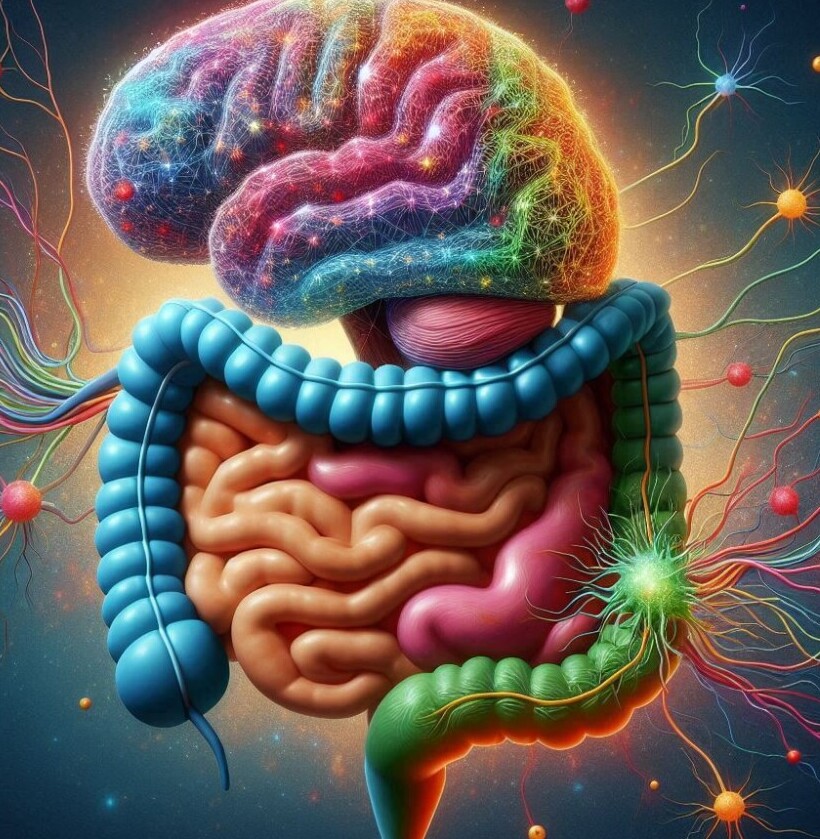
The gut-brain axis is a complex communication network linking your gut and brain. This fascinating biochemical signaling is pivotal in your overall health and well-being. Think of it as an ongoing conversation between your gut and central nervous system, where gut microbes send messages that can impact your brain’s function.
Gut microbes, those trillions of tiny organisms living in your digestive system, are crucial for more than just digestion. They help produce neurotransmitters like serotonin, dopamine, and gamma-aminobutyric acid (GABA), essential for mood regulation, focus, and relaxation. When your gut microbiome is balanced, it supports cognitive functions, keeping your mind sharp and mood stable.
Besides neurotransmitter production, gut microbes play a part in immune responses and inflammation control. A healthy gut can help ward off inflammation linked to several neurological conditions, including ADHD. A balanced gut can act as a buffer to help keep your brain functioning at its best.
Understanding how the gut-brain axis works can empower you to take charge of your gut health. Simple lifestyle changes, such as a balanced diet, regular exercise, and stress management, can help maintain this critical system. Focusing on gut health supports your digestive system and gives your brain the best chance to thrive.
The Link Between Gut Health and ADHD
Researchers are rapidly pursuing the relationship between gut health and ADHD. One key revelation is that the gut microbiota—the community of bacteria living in your gut—might play a role in ADHD symptoms. Studies have shown that individuals with ADHD often have different gut microbiota compositions compared to those without the disorder.
One notable study published in MDPI (Multidisciplinary Digital Publishing Institute highlighted that children with ADHD had lower levels of beneficial bacteria like *Bifidobacterium*. These bacteria are vital for maintaining gut health and supporting immune function. The imbalance in gut bacteria, known as dysbiosis, might exacerbate ADHD symptoms such as hyperactivity, impulsivity, and inattention. This suggests that addressing dysbiosis could potentially ease these symptoms.
Inflammation, while a natural immune response, can become problematic when it becomes chronic. Dysbiosis may trigger a heightened inflammatory state in the body, including the brain, potentially exacerbating ADHD symptoms. Thus, maintaining a balanced gut is crucial for digestive health and supporting better cognitive and emotional well-being.
Dysbiosis and Inflammation: A Major Factor in ADHD
When the gut is out of balance, it can trigger a cascade of adverse effects throughout the body, particularly increased inflammation. In ADHD, this inflammation is linked to the worsening of symptoms such as impulsivity, hyperactivity, and inattention. Studies show that individuals with ADHD often display markers of chronic inflammation, suggesting a clear link between gut health and neurological disorders.
Chronic inflammation in the brain can disrupt cognitive function and exacerbate ADHD symptoms. Therefore, supporting a healthy gut microbiota through diet and lifestyle choices may play a crucial role in managing ADHD symptoms. Avoiding processed foods, sugars, and unhealthy fats can help reduce gut inflammation, while fiber-rich foods, fermented foods, and probiotics can help restore balance in the gut microbiota.
Probiotics
Probiotics, the beneficial bacteria found in fermented foods and supplements, show promise in managing ADHD symptoms by restoring gut health. These live microorganisms can help rebalance gut microbiota, potentially alleviating the effects of dysbiosis and inflammation. Research has begun to explore the effectiveness of probiotics in ADHD management. Initial findings suggest that certain probiotic strains may positively influence brain function by producing neurotransmitters, reducing inflammation, and supporting immune responses.
Some studies have even reported improvements in attention and behavior in children with ADHD who took specific probiotic supplements. However, while these results are encouraging, it’s essential to note that the research is still in its early stages. More extensive studies are needed to confirm the therapeutic potential of probiotics for ADHD.
Research on the gut-brain axis may lead to better ADHD treatments. Meanwhile, improving gut health can help support cognitive function and emotional regulation. To explore high-quality probiotic supplements, check out our detailed comparison of Unbloat vs. Zenwise, two of the most popular products on the market. This review will help you find the best solution to support your gut and manage symptoms related to gut imbalances
4 Ways People With ADHD Can Better Their Gut Health

If you’re looking to improve gut health to ease ADHD symptoms potentially, here are four key strategies to consider:
- Eat a Plant-Rich Diet: Focus on consuming whole, plant-based fiber-rich foods. Foods like leafy greens, fruits, vegetables, and legumes can support healthy gut bacteria, reducing inflammation and promoting a balanced gut microbiota.
- Prioritize Your Sleep: A regular sleep schedule helps regulate the brain and gut. Lack of sleep can disturb gut microbiota and disrupt the gut-brain axis, making ADHD symptoms harder to manage.
- Get Enough Exercise: Physical activity has been shown to boost the diversity of gut bacteria. Regular exercise can also lower inflammation and improve overall brain function, making it a valuable tool for managing ADHD symptoms.
- Spend Time in the Great Outdoors: Time spent outside, particularly in nature, has been linked to stress reduction and improved gut health. Lower stress levels can support a healthier gut environment, contributing to better mental clarity and focus.
Prebiotics and Other Emerging Theories
Beyond probiotics, researchers are also exploring the potential of prebiotics, non-digestible fibers that feed beneficial gut bacteria. Foods rich in prebiotics, like garlic, onions, bananas, and whole grains, can help strengthen your gut microbiota and contribute to a healthier gut-brain axis. Incorporating prebiotics and probiotics into your diet may provide a comprehensive approach to improving gut health and mitigating ADHD symptoms.
Additionally, lifestyle factors such as exercise, stress management, and sleep profoundly impact gut health. Regular physical activity has been linked to increased diversity in gut bacteria, while good sleep hygiene can help regulate the gut-brain axis. Implementing these lifestyle changes, in combination with diet modifications, could offer a holistic strategy for ADHD management.
Fecal Microbiota Transplantation
An emerging area of research involves Fecal Microbiota Transplantation (FMT), an experimental procedure where gut bacteria from a healthy donor are transplanted into the recipient’s gut. Early studies have shown that FMT can restore gut balance in various conditions, and researchers are investigating its potential in managing ADHD. While still in the experimental phase, this innovative treatment may offer future possibilities for managing gut-related aspects of ADHD.
Are You Considering Including Probiotics in Your Routine?
If you’re thinking of incorporating probiotics into your routine, starting with foods rich in natural probiotics such as yogurt, kefir, sauerkraut, kimchi, and miso is an excellent first step. These foods can introduce beneficial bacteria into your gut, potentially helping to balance your microbiota.
Before starting any new supplement, consulting with a healthcare provider is always a good idea. They can provide personalized advice and ensure that probiotics are a safe and suitable option for you or your child. Balancing your gut with probiotics can be a simple yet effective step toward better managing ADHD symptoms.
Emerging Theories and Future Directions
Research on the link between gut health and ADHD is continually evolving, and new theories continue to emerge. One compelling area of focus is the potential for targeted interventions that improve gut health to manage ADHD symptoms more effectively. These interventions could range from dietary modifications to novel therapies like FMT and prebiotic use.
Looking ahead, the future of ADHD management may increasingly focus on gut health as a central component. Integrating these emerging strategies with conventional treatments could provide a more comprehensive approach to managing the condition. As research continues to uncover the intricate connections between the gut and brain, there will likely be more innovative ways to support both gut and mental health. Staying informed and open to new findings will be key in navigating this evolving landscape.
Conclusion
The connection between gut health and ADHD is an exciting and evolving field of research. While there is still much to learn, current findings suggest that maintaining a healthy, balanced gut may play a significant role in managing ADHD symptoms. Incorporating probiotics, prebiotics, and other lifestyle changes such as improved diet, regular exercise, and good sleep hygiene can contribute to better gut health, potentially offering broader benefits for mental well-being.
As researchers continue to explore the gut-brain axis, we may discover even more targeted and effective strategies for ADHD management. Until then, improving gut health can be a proactive and beneficial approach for those seeking natural ways to support cognitive function and emotional regulation. For more information on effective supplements, don’t forget to check out our comparison of Unbloat vs. Zenwise to find a product that may suit your needs.
